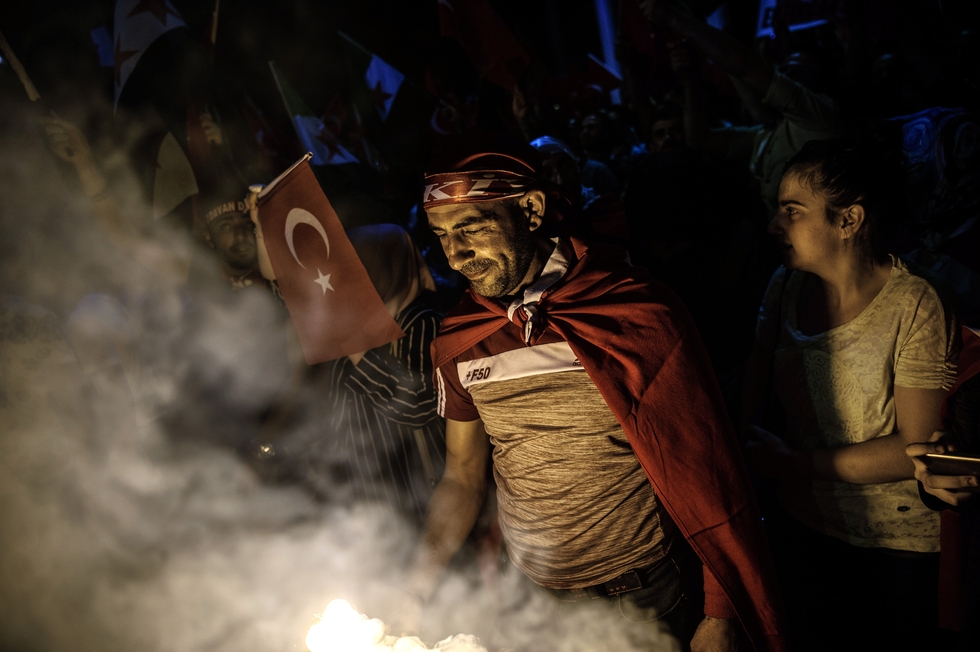Turkey coup accused beaten and raped in custody: Amnesty

Human rights group Amnesty International said on Sunday it had "credible evidence" of abuse and torture of people detained in sweeping arrests since Turkey's 15 July attempted military coup.
The London-based group said some of those being held were being "subjected to beatings and torture, including rape, in official and unofficial detention centres in the country".
Amnesty said more than 10,000 people have been detained since the attempted coup, and the group called for independent monitors to be granted access to detention sites across Turkey.
Amnesty raised serious allegations of mistreatment against Turkish police, who they said have held detainees in “stress positions, denied them food, water and medical treatment, verbally abused and threatened them, and subjected them to beatings and torture, including rape and sexual assault”.
Two lawyers working in the capital Ankara on behalf of detainees told Amnesty they witnessed “senior military officers in detention being raped with a truncheon or finger by police officers”.
Another source told Amnesty between 650 and 800 soldiers have been detained at the Ankara police headquarters sports hall. The source said “at least 300 of the detainees showed signs of having been beaten”.
“Reports of abuse including beatings and rape in detention are extremely alarming, especially given the scale of detentions that we have seen in the past week. The grim details that we have documented are just a snapshot of the abuses that might be happening in places of detention,” said Amnesty International’s Europe director John Dalhuisen.
"It is absolutely imperative that the Turkish authorities halt these abhorrent practices and allow international monitors to visit all these detainees in the places they are being held.”
A Turkish official, who asked to remain anonymous, told MEE that the government rejects Amnesty's allegations of mistreating detainees.
"We categorically deny the allegations and encourage advocacy groups to provide an unbiased account of the legal steps that are being taken against people who murdered nearly 250 civilians in cold blood," the official said.
"The idea that Turkey, a country seeking EU membership, would not respect the law is absurd. Just yesterday we released 1,200 military personnel because all we care about is concrete evidence of complicity in this grave assault against our democracy."
Since the failed coup, a total of 13,165 people have been detained, President Recep Tayyip Erdogan said late on Saturday.
This included 8,838 soldiers, 2,101 judges and prosecutors, 1,485 police officers and 689 civilians.
At least 123 generals and admirals have also been jailed, Turkish Prime Minister Binali Yildirim said.
Amnesty said that while Turkey has legitimate security concerns in light of the attempted coup, abuses of human rights are never acceptable.
"Turkey is understandably concerned with public security at the moment, but no circumstances can ever justify torture and other ill-treatment or arbitrary detention," Dalhuisen said.
Speaking at a unity rally held in Istanbul on Sunday evening, opposition leader Kemal Kilicdaroglu told huge crowds of people from across the Turkish political spectrum that mistreatment of detainees "shouldn't be allowed".
The leader of the centre-left CHP said, without specifically mentioning the Amnesty report: "The state cannot be run based on hate and vengeance. The rule of law needs to prevail. Torture, pressure in response will put state and putschists on same page and shouldn’t be allowed."
This article is available in French on Middle East Eye French edition.
Stay informed with MEE's newsletters
Sign up to get the latest alerts, insights and analysis, starting with Turkey Unpacked
Middle East Eye delivers independent and unrivalled coverage and analysis of the Middle East, North Africa and beyond. To learn more about republishing this content and the associated fees, please fill out this form. More about MEE can be found here.




